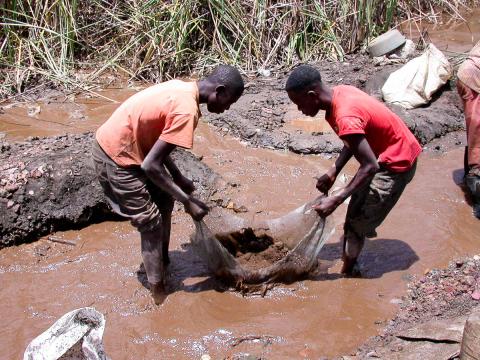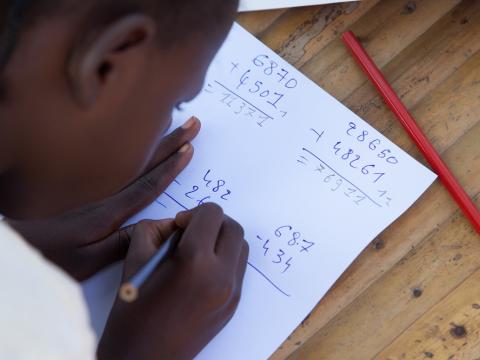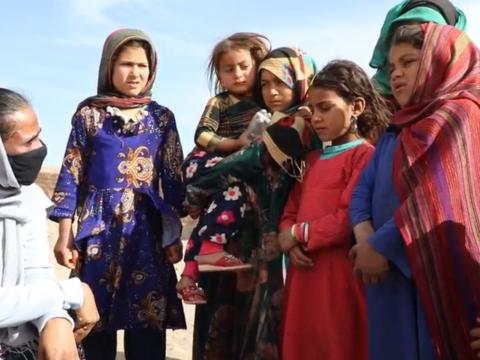
Youth help shape a new campaign on education in emergencies
Georgia Potton, Head of Activism at 100million.org write about an important new campaign to demand that education in emergencies is fully financed and politically supported by governments everywhere.
Over half of the world’s refugees are children, fleeing from conflict, crises and climate chaos they had no part in creating. Sadly, the number of children experiencing this injustice has been rising quickly in recent years, increasing by 116% between 2010 and 2020 alone. Worldwide over 33 million children are forcibly displaced, putting their rights to freedom, safety and education at dangerous risk.
Defending the right to education in emergencies is critical to ensuring children and young people on the move are not left further behind and their futures are not further disrupted. Unfortunately, political will and funding to support education in emergencies is severely lacking. In 2019, almost half of all the out of school children in the world (127 million) were living in crisis-affected countries, but education received only 2.4% of humanitarian funding, far below the 2012 UN target of 4%.

An important new partnership campaign is being created by key global education stakeholders and organisations to demand that education in emergencies is fully financed and politically supported by governments across the world. Organisations including the 100 Million campaign, Global Students Forum, Inter-agency Network for Education in Emergencies, Plan International, Save the Children, and World Vision International are coming together to push for the target of mobilising at least $1.5 billion for Education Cannot Wait (ECW), the only global multilateral fund for education in emergencies.
Young people, students and their representative, and self-led organisations are being invited to take a leadership role not just in the delivery of this campaign but its creation. Too often youth activists and student leaders are called upon to champion or promote initiatives they had no say in developing, even when their rights are the focus of the campaign.
Youth- and student-led consultations
To support this genuine engagement, in April and May 2022 the 100 Million campaign organised in-depth consultations with three core constituencies to consider the components of a call for financing for education in emergencies. The consultations included a comprehensive survey and online meeting, during which participants contributed what they felt were the greatest challenges in ensuring continued access to education in emergencies, the programmes, services and policies could help and identifying main barriers to achieving political support for this cause.

The first consultation was held with the ECW Youth- and Student-led Subgroup, the democratic constituency representing youth-led organisations within ECW’s governance structures, with 24 youth-led organisations, including ones led by young refugees themselves, taking part. The issue of existing discrimination and marginalisation came out strongly in the discussions, with many participants highlighting the extra vulnerabilities facing girls and young women during crises: from early pregnancy, forced marriage, to gender-based violence and sexual exploitation in the home.
It was also recognised that during emergencies “humanitarian relief and livelihood streams are cut and priorities are shifted from education to food and basic needs. Children become engaged in child labour during the floods instead of going to school, which affected their transition to higher levels of education”. As youth-led organisations already active in defending education in emergencies, the group strongly recommended “empowering local solutions that are context specific”, highlighting how “a one size fits all solution often offers an instant but unsustainable solution to the shortage of resources in both camps or informal schools”.
The next consultation was with individual youth activists, ranging from 18 to 28 years old from 13 countries: Japan, Liberia, India, Malawi, Nigeria, Zimbabwe, Kenya, Pakistan, Sierra Leone, Ghana, UK, Democratic Republic of Congo, and Ethiopia. Again, respondents highlighted the economic insecurity and poverty triggered during emergencies impacting the ability to continue learning: from being unable to afford school fees, to being forced to work to meet basic needs or being unable to access free internet and own the necessary technology.
When asked what should be prioritised to protect education in emergencies, youth activists emphasised the need for services such as “mental health support”, “trauma healing”, “reunification and tracing of families” and “social protection floors that provide feeding programmes”. They also stressed the need for more preparedness from governments: “Governments should already have funds that are reserved for emergencies. In Malawi, there was a recent cyclone that people had to relocate and the government was unprepared and people had to move to temporary shelters”
Finally, the last consultation was with members of the Global Student Forum from Bangladesh, Italy, Latvia, Kenya, the Democratic Republic of Congo, Ghana, Ethiopia, Liberia, Tanzania, India, France, Nigeria, Spain, Zimbabwe and Jamaica. Speaking from a primarily student union perspective, members once again raised the issue of food insecurity, poverty and poor data connection as critical barriers to learning during emergencies. They advocated for stronger policies to “reduce the digital divide” and emphasised the need to subsidise or waive all tuition fees during crises.
In response to why education in emergencies is not a current priority for governments, GSF members raised that many government officials send their children to study in private schools or abroad and therefore either do not understand or do not care enough about the state of public education systems or the reality of learners' needs during emergencies.
Despite some differences in what should be prioritised, each constituency is strongly united behind the importance of ensuring education in emergencies is approached and understood by all stakeholders as a fundamental human right, not an afterthought or act of charity.
Next steps
As one participant in a consultation powerfully remarked, the challenges in ensuring education during times of crises were partly “due to a lack of equity and collective responsibility of all of us”. Defending the right to education in emergencies requires all of us to work together and demand change.
The results of all three consultations will be at the core of the development of a call for financing to be launched ahead of the Transforming Education Summit and United Nations General Assembly in September 2022. At every stage young people, students and their representative organisations will be engaged and encouraged to shape and lead the campaign. Nothing about us, without us!


